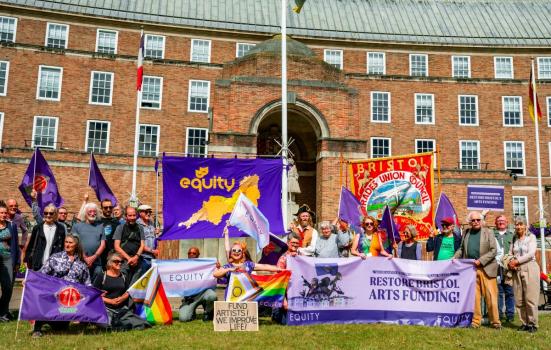
Earlier this year Equity staged a demonstration outside City Hall to protest the council's delayed funding process
Equity condemns ‘cruel’ arts cuts by Bristol Council
Bristol's Deputy Mayor Craig Cheney said that arts organisations in the city need to "stand on their own two feet".
Bristol Council’s decision to cut funding to some of the city’s best known cultural organisations has been branded as “cruel" and “less than transparent” by performers' union Equity.
Noting the impact of the funding losses on performing arts venues, including Bristol Old Vic, St Georges and the Wardrobe Theatre, Equity accused the council of “financial mismanagement”, adding that the “timing of and delay to these decisions will cost the sector, our members and Bristol's cultural heritage dearly".
Last week, it emerged that a number of arts and culture organisations in Bristol had been earmarked to have their council funding axed from next year, following a year-long delay in the grant administration process that left some organisations facing severe financial difficulties and contributed to the closure of Theatre Bristol and Bristol Ideas.
READ MORE:
- Old Vic among Bristol arts organisations facing council cuts
- Bristol artists label funding delay ‘cruel and disrespectful’
Bristol City Council has previously said it stalled the funding process for 12 months because it was concerned its own decision-making process was "not sufficiently transparent”. The council brought forward its verdict from March to December, after protests by Equity.
In its recommendation report, the council acknowledged that the level of investment available to arts and cultural organisations through its Cultural Investment Programme has reduced by 40% over the last five years, from £1,015,960 in 2017/18 to £635,960 in 2022/23.
The report said: "The combination of these factors has meant that recommendations have required the intention of achieving a step change in diversifying the programme at the same time as adapting to reduced budgets." The council's cabinet will vote on the proposals tomorrow (5 December).
'Job losses and damage'
Responding to the announcement, Rachael Fagan, Equity’s South West Area Councillor, said: “These cuts have been made without thought to the job losses and damage to the sector in the city.
"This less than transparent decision making, which has been delayed for over 12 months, has caused two organisations to close for good and will now put 100s of jobs in the city at risk now and in the next four years due to this short-sighted strategy.
“It is unbelievable that despite knowing that companies were closing, causing job losses, Bristol City Council have ploughed ahead with this appalling funding announcement.
Calling on Bristol Mayor Marvin Rees to “restore the £75,000 worth of funding he has reportedly cut”, Simon Curtis, Equity’s Regional Official for the South West said: “Arts organisations preparing for the new financial year will not be willing to put on work and employ our members with this shock cut to their finances”.
'Stand on their own two feet'
Speaking at the re-opening of the £132m Bristol Beacon concert venue last week, Bristol's Deputy Mayor Craig Cheney said that although the city is well known for its thriving arts scene, policymakers have to “walk that line” to limit “snowballing” gentrification in the city.
He said: “Our [funding] strategy is about diversifying the arts and trying to make sure it’s not the same organisations that continue to get funded forever, that they get to stand on their own two feet, and we support new young things to come through the sausage machine, as it were.
"We’re supporting things like St Paul’s Carnival, which are huge iconic events for Bristol and are about continuing that diverse and exciting vibrant identity for the city.”
DragonBird Theatre, a company that runs accessible, participatory sessions and performances for children and adults, was one of several smaller organisations to miss out on the council's ‘Imagination’ funding. Co-founder Lotte Nørgaard said she was “shocked and saddened” by the decision.
“It seems such a waste not to continue to support established Bristol-born arts companies with a proven track record," she said.
Asked how he envisioned local arts organisations adapting from a funding-based model to a commercial one, Cheney said: “As a Labour politician, I absolutely believe in the funding of culture by the government; however, living in Tory Britain as we do today and with budget cuts that councils are facing it is hard to justify ongoing levels of investment in the arts.
"As the budget is getting harder to maintain, and costs are going up, and people’s needs are getting more complicated, it’s inevitable that anything that’s non-discretionary, that we don’t have to do legally, is gradually being driven down.”
Join the Discussion
You must be logged in to post a comment.